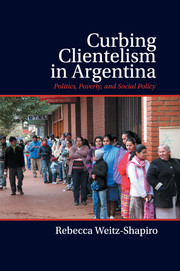Book contents
- Frontmatter
- Contents
- List of Illustrations
- List of Tables
- Acknowledgments
- 1 Accountability, Democracy, and the Study of Clientelism
- 2 Making Clientelism Work: Politician Behavior and Voter Beliefs
- 3 Curbing Clientelism: Why Some Politicians Opt Out
- 4 Clientelism, Social Policy, and Measurement
- 5 Clientelism across Municipalities in Argentina's National Food Security Program
- 6 Survey and Experimental Evidence for the Costs of Clientelism
- 7 Moving Toward Accountability? Comparative Perspectives and Policy Implications
- References
- Author Index
- Subject Index
6 - Survey and Experimental Evidence for the Costs of Clientelism
Published online by Cambridge University Press: 05 October 2014
- Frontmatter
- Contents
- List of Illustrations
- List of Tables
- Acknowledgments
- 1 Accountability, Democracy, and the Study of Clientelism
- 2 Making Clientelism Work: Politician Behavior and Voter Beliefs
- 3 Curbing Clientelism: Why Some Politicians Opt Out
- 4 Clientelism, Social Policy, and Measurement
- 5 Clientelism across Municipalities in Argentina's National Food Security Program
- 6 Survey and Experimental Evidence for the Costs of Clientelism
- 7 Moving Toward Accountability? Comparative Perspectives and Policy Implications
- References
- Author Index
- Subject Index
Summary
In this book, I argue for the importance of bringing the nonpoor into the analysis of political clientelism. While poor voters are most frequently the targets of clientelist exchange, they are not the only voters whose behavior may be affected by these exchanges. The core assumption around which the theory is built is that nonpoor voters dislike clientelism and are willing to withdraw political support from politicians who rely on it. Nonpoor voters might reject clientelism for one of two reasons. First, they might reject the practice out of a moral or normative disdain for the exchange of goods or services for political support. Second, they might reject clientelism out of self-interest. Clientelism does not occur in a vacuum. Most nonpoor voters rely on a variety of government services and administrative capabilities; the time and effort dedicated to making clientelism work may decrease the quality of government service provision more broadly. If either of these two mechanisms hold, nonpoor voters who are not a party to clientelist exchange might withdraw support from a politician who relies on it. In this chapter, I test that claim using original analyses of two separate public opinion surveys in Argentina: a large in-person survey of a representative sample of the Argentine population, and an original telephone survey experiment of somewhat better-off voters. Results from both surveys provide compelling evidence that Argentine citizens who are not poor react negatively to information about clientelism and related practices.
- Type
- Chapter
- Information
- Curbing Clientelism in ArgentinaPolitics, Poverty, and Social Policy, pp. 121 - 149Publisher: Cambridge University PressPrint publication year: 2014

